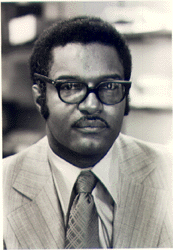
John Wesley Blassingame
Encyclopedia

Yale University
Yale University is a private, Ivy League university located in New Haven, Connecticut, United States. Founded in 1701 in the Colony of Connecticut, the university is the third-oldest institution of higher education in the United States...
. He died at age 59. The cause of death was not known according to his son, John W. Blassingame Jr.
Blassingame was born in Covington
Covington, Georgia
Covington is a city in Newton County, Georgia, United States. As of the 2010 census, the city had a population of 13,118. The city is the county seat of Newton County...
, Georgia
Georgia (U.S. state)
Georgia is a state located in the southeastern United States. It was established in 1732, the last of the original Thirteen Colonies. The state is named after King George II of Great Britain. Georgia was the fourth state to ratify the United States Constitution, on January 2, 1788...
, to Grady and Odessa Blassingame. He received a bachelor’s degree at Fort Valley State College (1960), a master’s degree at Howard University
Howard University
Howard University is a federally chartered, non-profit, private, coeducational, nonsectarian, historically black university located in Washington, D.C., United States...
(1961), and a master’s degree (1968) and a doctorate (1971) at Yale University. Blassingame joined the faculty at Yale University in 1970 and became a history professor in 1974. He remained at Yale University as a professor of history, African-American studies, and American Studies for 29 years.
Blassingame wrote and edited several books, including New Perspectives on Black Studies (1971), The Slave Community: Plantation Life in the Antebellum South
The Slave Community
The Slave Community: Plantation Life in the Antebellum South is a book written by American historian John W. Blassingame. Published in 1972, it is one of the first historical studies of slavery in the United States to be presented from the perspective of the enslaved...
(1972), Black New Orleans, 1860-1880 (1973), and Frederick Douglass, the Clarion Voice (1976). In addition, Blassingame collected slave letters, interviews, and other materials in his Slave Testimony: Two centuries of Letters, Speeches, Interviews, and autobiographies (1977), which include a large selection of annotated and authenticated accounts of slaves speaking for themselves during the slavery period of Thomas Jefferson
Thomas Jefferson
Thomas Jefferson was the principal author of the United States Declaration of Independence and the Statute of Virginia for Religious Freedom , the third President of the United States and founder of the University of Virginia...
, Robert E. Lee
Robert E. Lee
Robert Edward Lee was a career military officer who is best known for having commanded the Confederate Army of Northern Virginia in the American Civil War....
, Henry Clay
Henry Clay
Henry Clay, Sr. , was a lawyer, politician and skilled orator who represented Kentucky separately in both the Senate and in the House of Representatives...
, and others. From 1979 to 1999, Balssingame worked on editing the papers of Frederick Douglass
Frederick Douglass
Frederick Douglass was an American social reformer, orator, writer and statesman. After escaping from slavery, he became a leader of the abolitionist movement, gaining note for his dazzling oratory and incisive antislavery writing...
and published six volumes of Douglass’s papers and manuscripts. He also joined several writers in his work of editing and writing. He was a co-author with Mary F. Berry in Long Memory: The Black Experience in America (1982), and a co-editor with Louis Harlan in The Autobiographical Writings of Booker T. Washington (1972).
Blassingame was a lifelong member of many history preservation, heritage, and educational organizations such as the American Historical Association
American Historical Association
The American Historical Association is the oldest and largest society of historians and professors of history in the United States. Founded in 1884, the association promotes historical studies, the teaching of history, and the preservation of and access to historical materials...
, Southern History Association, the Phi Beta Sigma
Phi Beta Sigma
Phi Beta Sigma is a predominantly African-American fraternity which was founded at Howard University in Washington, D.C. on January 9, 1914, by three young African-American male students. The founders A. Langston Taylor, Leonard F. Morse, and Charles I...
fraternity, and the Phi Alpha Theta
Phi Alpha Theta
Phi Alpha Theta is an American honor society for undergraduate and graduate students and professors of history.The society is a charter member of the Association of College Honor Societies and has over 350,000 members, with about 9,500 new members joining each year through 860 local chapters.-...
honor society.
Blassingame is survived by his wife Teasie Jackson Blassingame, son John W Blassingame Jr., daughter Tia Marrie and father Grady Blassingame.

